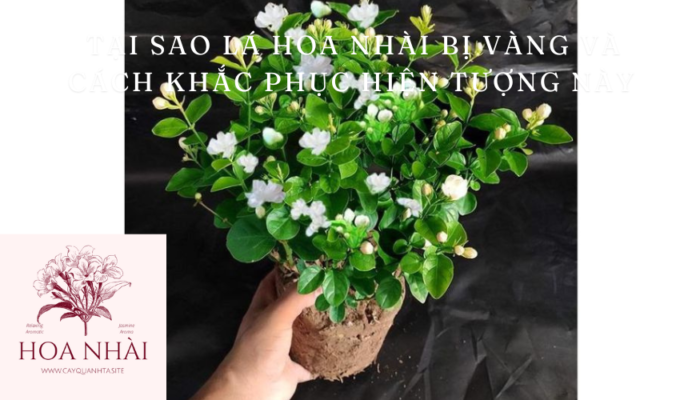
“Why do jasmine flower leaves turn yellow and how to fix this phenomenon? The secret to effectively treating yellow jasmine flower leaves.” – This article will help you understand why JAPANESE flower leaves turn yellow and how to treat them effectively.
1. Introduction to the phenomenon of jasmine flower leaves turning yellow
When jasmine leaves start to turn yellow, it is a clear sign that the plant is lacking nutrients. Yellow leaves are a sign of lack of fertilizer, so fertilizer should be applied as soon as possible to supplement nutrients and help the leaves return to dark green.
Causes of jasmine leaves turning yellow
There are many reasons why jasmine leaves turn yellow, including lack of fertilizer, hard and compact potting soil, or both of the above causes. To resolve this situation, it is necessary to identify the specific cause and take appropriate remedial measures.
How to handle jasmine leaves turning yellow
– Fertilize promptly to supplement nutrients for plants
– Check pot soil and change soil if necessary
– Water and fertilize properly to ensure plants are provided with enough nutrients
2. What causes jasmine flower leaves to turn yellow?
1. Lack of nutrients
One of the main causes of jasmine leaves turning yellow is lack of nutrients. Jasmine needs to be fertilized periodically to provide enough nutrients for growth and flowering. If not enough nutrients are added, flower leaves will begin to turn yellow due to lack of amino acids and essential minerals.
2. Unsuitable potting soil
Another cause may be that the potting soil does not meet the needs of jasmine. If the potting soil becomes hard and compact, not breathable and does not have enough nutrients, the flower leaves will begin to turn yellow. This can also result in the plant being unable to absorb fertilizer effectively, causing nutrient deficiencies.
Why do jasmine flower leaves turn yellow and how to fix this phenomenon
3. The impact of jasmine flower leaves turning yellow on plants
1. Affects plant health
When jasmine leaves turn yellow due to lack of nutrients, the plant becomes weak and finds it difficult to cope with diseases and pests. Leaves and branches are severely affected, leading to overall weakening of the tree. This can have serious consequences for the health and survival of the tree.
2. Impact on the environment
When jasmine plants do not grow and bloom properly due to yellow leaves, it affects the surrounding environment. Trees not only bring beauty to green spaces but also play an important role in improving air quality and absorbing harmful gases. Therefore, the weakening of jasmine can affect the surrounding habitat, causing negative impacts on ecology and human health.
4. How to recognize yellow jasmine flower leaves
1. Color of leaves
When the leaves of jasmine begin to turn yellow, this is the clearest sign that the plant lacks nutrients. Jasmine leaves are usually dark green and if they start to turn yellow, it is a sign that fertilizer needs to be added promptly.
2. Leaf outline
In addition to color, you can also tell if jasmine leaves are lacking fertilizer by checking the leaf outline. If the leaf edges begin to brown or dry out, it is also a sign that the plant is having nutrient problems.
3. Plant growth
In addition to observing the color and outline of the leaves, you should also pay attention to the growth of the plant. If the plant looks slow to grow, blooms less and is not as fresh as before, it is also a sign that the plant is lacking nutrients.
5. Measures need to be taken to prevent jasmine flower leaves from turning yellow
1. Make sure to provide enough fertilizer
To prevent jasmine flower leaves from turning yellow, the most important thing is to ensure enough fertilizer is provided to the plant. According to the instructions in the content, jasmine needs to be fertilized 1-2 times per month, and this needs to be done on schedule. You can also use fermented organic fertilizers to provide nutrients for plants.
2. Check and adjust potting soil
Checking the potting soil and adjusting its fertility is also very important to prevent the yellowing of jasmine leaves. If the soil becomes hard and compact, you need to change the soil to loose and breathable soil. You can also add a little fermented and decomposed organic fertilizer to the bottom of the pot to increase soil fertility.
3. Water and fertilize properly
For potted jasmine, proper watering and fertilization also plays an important role. You can use fermented organic fertilizers to fertilize properly and ensure adequate nutrients are provided to the plants.
6. Plant care methods to avoid jasmine flower leaves turning yellow
Water properly
To avoid jasmine leaves turning yellow, you need to water them properly. Jasmine plants need to be watered regularly, but at the same time, it is necessary to avoid excessive soil moisture. If the soil stays wet for too long, the plant's roots may be damaged and yellow leaves may result. Make sure the potting soil has drainage holes and water in the morning to ensure the plant has enough water throughout the day.
Fertilize properly
Fertilization is also important to avoid yellowing of jasmine leaves. You need to fertilize the right amount and properly to provide enough nutrients for the plant. Use fermented organic fertilizer to provide acid to the potting soil, helping plants grow strongly and leaves from turning yellow. In addition, you also need to apply potassium and phosphate fertilizers to promote flowering.
7. The secret to effectively treating yellow jasmine flower leaves
1. Water properly
To treat yellow jasmine leaves, you need to pay attention to how you water the plant. Make sure the soil in the pot is always moist but not submerged. Watering properly will help plants absorb nutrients better and prevent yellow leaves.
2. Test the pH of the soil
Soil pH also affects the health of jasmine plants. Use pH test strips to check and adjust the acid-base level of the soil. Make sure the soil in the pot has the right pH so the plant can absorb nutrients effectively.
3. Use suitable fertilizer
Choose organic fertilizer or fertilizer that contains essential nutrients for jasmine such as potassium and phosphate. Fertilize according to instructions and periodically to help the plant restore health and stop yellow leaves.
8. How to fix jasmine flower leaves turning yellow
1. Treat jasmine leaves turning yellow
If you notice jasmine leaves turning yellow, first check to see if the plant is getting enough nutrients. If fertilizer is lacking, fertilize promptly to provide nutrients to the plant. In addition, it is necessary to ensure that the soil in the pot is loose and breathable so that the plant can absorb fertilizer effectively.
2. Use organic fertilizers and potassium fertilizers
For jasmine with yellow leaves, you can use fermented organic fertilizer to provide nutrients for the plant. In addition, adding potassium dihydrogen phosphate fertilizer can help the plant recover and create conditions for new flower buds to sprout. Remember to dilute potassium fertilizer at a ratio of 1:1000 to avoid harming the plant.
9. Common mistakes when handling yellow jasmine leaves
1. Undetermined cause
A common mistake when jasmine leaves turn yellow is not determining the cause of this condition. This can lead to ineffective treatment, as appropriate measures cannot be applied to correct yellow leaves.
2. Using fertilizer incorrectly
Many people often make the mistake of using fertilizer without knowing how to use it properly. Using too much or too little fertilizer can cause jasmine leaves to turn yellow. To overcome this situation, it is necessary to use fertilizer according to the instructions and in the correct dosage.
3. Not providing enough light and water
Also, another mistake is not providing enough light and water for jasmine. Lack of light can cause jasmine leaves to turn yellow and not grow properly. In addition, lack of water can also cause yellow leaves. To fix this, you need to make sure the plant is placed in a place with enough light and watered regularly according to the plant's requirements.
10. Self-care and restore yellow jasmine leaves at home
1. Determine the cause of jasmine leaves turning yellow
First, you need to determine the cause of jasmine leaves turning yellow. It could be due to lack of nutrients, too much water, or pests and diseases. Determining the cause will help you choose the right care and recovery method.
2. Provide nutrients for jasmine
After determining the cause, you need to add nutrients to jasmine. Applying fermented organic fertilizer to pot soil can help balance the acid-base of the soil, creating good conditions for plant growth.
- Apply potassium dihydrogen phosphate fertilizer once a week, diluted at a ratio of 1: 1000 to water the roots and spray on branches and leaves.
- Add phosphate and potassium fertilizer to promote flowering.
3. Adjust the amount of irrigation water
In addition to adding nutrients, you also need to adjust the amount of water for jasmine. Make sure the soil in the pot is not flooded, and water regularly but not too much to avoid yellow leaves.
Yellow jasmine flower leaves can be caused by many reasons such as lack of light, water, or disease. To fix it, it is necessary to provide enough water, light and check the health of the plant.



